Caliphate? What an Islamic state means to British Muslims
- Published
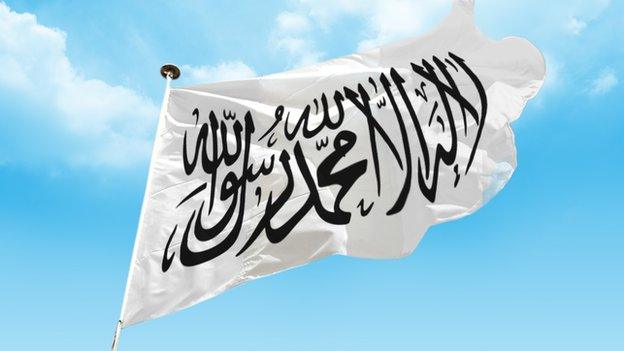
A caliphate flag used by Muslims historically reads "There is no god but Allah; Muhammad is the Messenger of Allah"
When the extremist group Isis (now known as Islamic State or IS) declared a caliphate taking in parts of Syria and Iraq it reignited a debate over the role of an Islamic state.
For many a caliphate is a political leadership, others a spiritual figurehead, and for some a combination of the two.
"What we're seeing being carried out against helpless civilians like the Yazidis and other groups isn't what an Islamic state is about," says Yasmin Khatun, a journalist from London.
The 26-year-old is a Sunni Muslim - they make up the vast majority of UK Muslims.
What is a caliphate?
•The institution of a caliphate (khilafah in Arabic) is how Muslims were led for centuries after the death of the Prophet Muhammad.
•The last widely recognised one was the Ottoman Empire which was abolished in Istanbul in 1924.
•Caliph or khalifa - which means "successor" - is deemed by certain strands of Islam to be a leader destined to unite the Muslim "ummah" or community.
•The position of caliph is often likened to that of a pope, a king, or head of state.
•Many of those who want a caliphate today compare it to having an Islamic superpower - "an America for Muslims".
•It would also be a place to live that would be governed by Sharia law, the Islamic legal system.
Yasmin Khatun, 26, a journalist from London is a Sunni Muslim
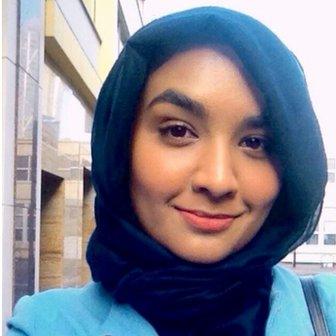
Yasmin believes in the idea of a caliphate but says Isis have hijacked the concept through their use of violence against religious minorities.
She believes the UK's foreign policy has left some Muslims feeling isolated and seeking an alternative solution.
"Young people are disillusioned with policies coming out from the British government and its NATO allies."
"When you look at what's happening in Syria and Gaza, there's just this feeling that they will not protect Muslim civilians and, as a result, you have some Muslims who feel a caliphate would better protect and represent them.
Mina Topia, 29, a business development manager from Birmingham, is a Sunni Muslim
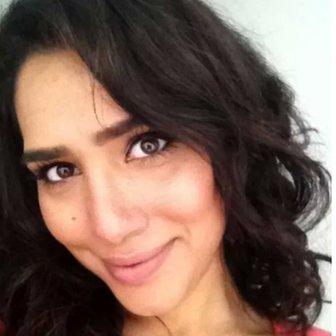
Mina describes herself as a progressive Muslim that grew up in an orthodox Sunni household. She recognises the theological concept of a caliphate but thinks the idea should be confined to history.
"For me the caliphate means a totalitarian state, and I think it's wrong.
"I wouldn't agree with any state which tries to curtail anyone else's right based on their religion, their sexuality, their creed or their political leaning and to me a caliphate seeks to control all of that."
"I think the history of the caliphate has been romanticised to serve a political agenda."
Joy Ahmed, 27, works in banking, lives in south London and is a Sunni Muslim
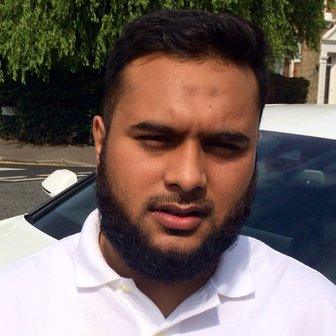
Joy has been following updates about the declaration of a caliphate by Isis. He is sceptical about reports of Isis violence but undecided about their claim to a caliphate.
Like Yasmin he says the treatment of Muslims in the UK means some are looking for an alternative.
"Before September 11 people used to ask me - are you Muslim? What country's that bruv?
"Now they're telling me about how Sharia law is barbaric. It's like everyone became professors in Sharia all of a sudden."
"As Muslims we are under the microscope. Day by day there's been an alienation of Muslims in the UK over issues like the hijab, halal meat, Muslim men being made out to be radicalised.
"If there was a fully established caliphate it would provide somewhere for Muslims to call their own,"
"I'm never going to say I hate Britain but at the same time, I'd like to have something that represents me, internally, spiritually, to be there as well."
Zahra Abdeali, 31, is a recent graduate and a Shia Muslim
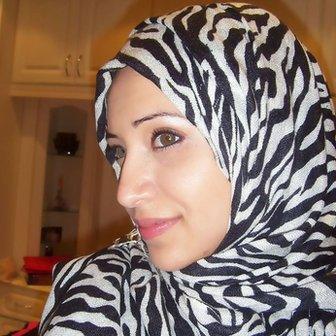
Zahra doesn't believe that a caliphate is needed in Islam today.
She believes a caliph cannot be appointed by humans and that it should be someone chosen by God only.
"We had the Prophet (Muhammad) which the majority of Muslims should believe to be infallible, and he had the right to lead.
"And coming from a Shia point of view, I don't believe the Prophet Muhammad left behind a designated leader."
"Personally I don't agree with what's happening at the moment, have a caliphate state set up in Iraq and Syria because they are killing people and that is not what Islam promotes.
"It says in the Qur'an that if you kill one person in humanity it's as if you kill the whole of humanity, and if you save one person it's as if you save the whole of humanity."
Fida, 23, is studying accounting and is an Ahmadi Muslim
Some Muslims do not consider Ahmadi Muslims to be Muslim because of their beliefs.
The Ahmadiyya Muslim community are a reformist sect of Islam that believes in a subservient prophet after Muhammad, and are led worldwide by a caliph who lives in South London - Mirza Masroor Ahmad.
Fida argues that politics have nothing to do with a caliphate and that a caliph is a spiritual leader only.
"My view is very different. I think there are two things that a caliph has to fulfil.
"He has to bring people closer to God, and he has to unify mankind. Man cannot appoint a caliph - and there isn't a political side to it."
Saif Ul Islam, 31, is self-employed and was born Hindu but converted to Sunni Islam
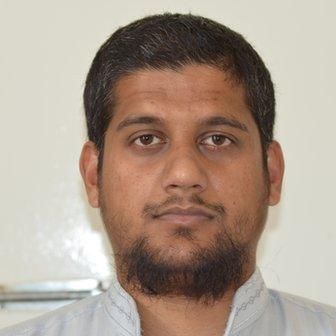
Saif holds the view that would be considered the most extreme of this group - he supports the Islamic State caliphate despite their violence and thinks that the group's leader Abu Bakr al-Baghdadi is a valid caliph.
"The caliphate for me is a government, a state which rules by the Qur'an and Sunnah (practices of the Prophet Muhammad), and those laws are over Muslims and non-Muslims.
"There is one leader who is governing over the people and that state has borders, borders that expand and they literally annex other countries until the whole world is under that governing authority."
"It is quite a revolution we're witnessing now happening in Iraq and Syria. Basically from what I've seen on the news and reports on the ground I believe they have restored the mighty caliphate that has been missing for so long."
You can hear Caliphate: Searching for the Islamic State online now
You can also hear Caliphate: Searching for the Islamic State online on Thursday 14 August at 1700 on BBC Asian Network and Saturday 16 August on BBC World Service.
Follow @BBCNewsbeat, external on Twitter and Radio1Newsbeat, external on YouTube.